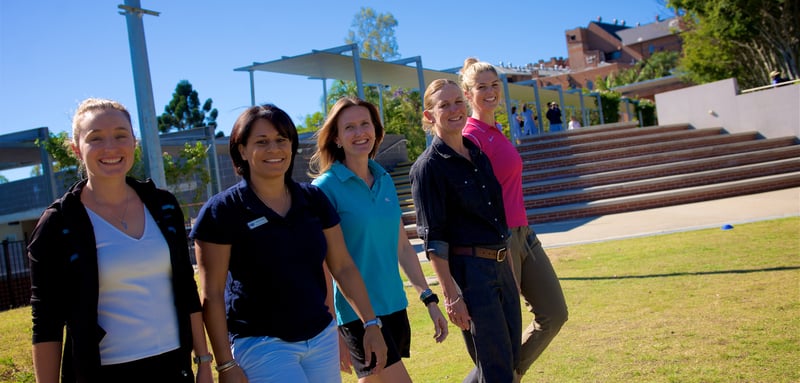 ‘Aspire to inspire life-long health and wellness’, this is the vision of the Stuartholme Health and Physical Education Department.
‘Aspire to inspire life-long health and wellness’, this is the vision of the Stuartholme Health and Physical Education Department.
Like any good vision statement, this one clearly describes the department’s purpose, it articulates the values and gives direction for staff behaviour.
It’s fair to say we’re more used to seeing vision statements on a company’s boardroom wall that we are in a HPE Department, but when you look at the depth of the current HPE curriculum you can see why this guiding statement is so important.
HPE is not just about sport, or physical health. HPE is a fully holistic curriculum that equally looks at the human body from the inside out, including emotional resilience, mental health, anatomy, exercise science, public health and social work to name a few.
The HPE staff, under the leadership of Geraldine Ebbrell, are passionate about health and have developed a curriculum that sets students up for life-long health and wellness.
“The biggest myth about HPE is that it’s just about sport,” Geraldine said.
“At one time, many years ago, that may have been the case, but the curriculum has progressed way beyond that and I don’t think people realise exactly what it incorporates.”
More recently, HPE is a subject that retracts from the increasingly complex and sedentary changes as a result of technology and media to teach students to not only cope with life’s challenges but also to flourish as healthy, safe and active citizens in the 21st century. Movement is at the core of HPE, where it is a powerful medium for learning through which students can practice and refine personal, behavioural, social and cognitive skills. For Year 7 students, their introduction to HPE looks at emotional resilience.
“Transitioning from Year 6 at Primary School, to Year 7 at High School can be very stressful,” Geraldine explained.
“We educate the students on what being emotionally resilient means and give them skills and strategies to help them cope.”
As the Year 7 cohort are getting to know one another, the staff get them moving with modified games, designed to get the students working together and making new friends.
Before the full school Swimming Carnival, the Year 7 students also take part in ‘Swimfest’, which is a fun way to get students into the water.
“We don’t want the Year 7 students to feel overwhelmed at the Swimming Carnival, so Swimfest is a great way to get them to participate. It’s also a really fun carnival with wipe out balls which everyone enjoys.”
Year 8 is about minimising harm, and during the year the students look at a wide range of topics including cyber bullying and how to protect yourself online, to physical health and the importance of staying fit and healthy through participation in various physical activities from competitive to recreational.
“For our practical work, we get the students involved in an ‘amazing race’, which has them running all over the school.”
By Year 9, the curriculum looks more deeply into fitness and wellness.
“In Year 9 the students have a strong foundation of mental and physical wellness, so can explore topics such as food and nutrition and the benefits of healthy food and exercise in far more detail.”
“As part of mental and physical wellness we look at topics around body image, peer pressure and self-esteem.
“There is an excellent program by Dove called the Confident Me Program. This really resonates with the students as they look at appearance ideals, media messages, comparisons and body talk.”
For their physical task, the students partake in a synchronised swimming unit. This unit is undertaken because, along with many other female sports, this is one that is always criticised for being a part of the Olympic Games.
“We like to show the girls that it takes as much stamina, strength and co-ordination as other aquatic activities to perfect. It is also a great way to practice working together, and as part of a team. The girls don’t realise it, but they spend the entire lesson treading water and for some classes that can be up to 90 minutes,” Geraldine explained.
Year 10 is the last year students must take HPE as a subject, so the team work very hard to ensure the students are prepared to manage their own health and wellness should they decide not to take a HPE subject in Years 11 and 12.
“In Year 10, we get the students to analyse their own health, and that includes their physical, social and emotional health.
“They do this by keeping a health diary where they can talk about how they are currently looking after themselves and how making small changes to improve their overall health.”
As part of the curriculum, all Year 10 students undertake training to receive their First Aid certificate.
“Health and wellness is also about having fun, so to finish the year, we look at lifestyle activities that you can do as part of daily living.”
As a subject choice in Years 11 and 12, students can either do PE, which looks at both practical and theory, or Health, which has no practical aspect.
“Students choose to continue with PE or Health, not only because they have an interest in the subject, but because they are looking at a range of careers that PE or Health can help them with, such as nursing, paramedics, nutrition, dietitian or physiotherapy to name a few.”
Senior Health also looks at societal trends including diabetes, heart disease and mental health. Students are taught strategies to help with anxiety and stress and how to control their expectations.
“Our vision is very clear, we want health to be the cornerstone of each student’s life, in 10, 20, 30 years and more, we want them to be actively participating in their own health.”


